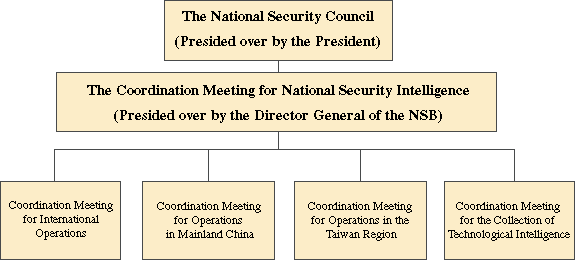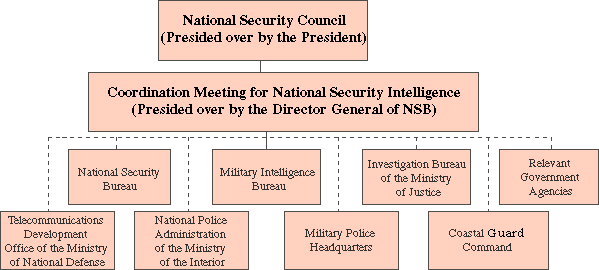





 The National Security Bureau was established on March 1, 1955, falling directly under the National Defense Council (NDC). In 1967 the National Security Council (NSC) was set up to replace the NDC, and the NSB became a subsidiary organ under the NSC. The National Security Bureau put police and the re-organized secret peace-keeping intelligence agencies under its control. Under the National Security Bureau's command, there were: (1) administrative organizations such as Police Administration Office, Bureau of Exit and Entry Control, Investigation Bureau of Justice Department; (2) military agencies such as Taiwan Garrison Command Headquarters, General Political Combat Unit, Military Intelligence Bureau and Military Police Headquarters; (3) KMT organizations such as Social Work Committee, (Chinese) Mainland Maneuvers Committee and Overseas Maneuvers Committee, among which directly affecting the daily life of the Taiwanese were Police Administration Office, Bureau of Investigation, Garrison Command, Military Police and Social Works Committee.
The National Security Bureau was established on March 1, 1955, falling directly under the National Defense Council (NDC). In 1967 the National Security Council (NSC) was set up to replace the NDC, and the NSB became a subsidiary organ under the NSC. The National Security Bureau put police and the re-organized secret peace-keeping intelligence agencies under its control. Under the National Security Bureau's command, there were: (1) administrative organizations such as Police Administration Office, Bureau of Exit and Entry Control, Investigation Bureau of Justice Department; (2) military agencies such as Taiwan Garrison Command Headquarters, General Political Combat Unit, Military Intelligence Bureau and Military Police Headquarters; (3) KMT organizations such as Social Work Committee, (Chinese) Mainland Maneuvers Committee and Overseas Maneuvers Committee, among which directly affecting the daily life of the Taiwanese were Police Administration Office, Bureau of Investigation, Garrison Command, Military Police and Social Works Committee.
The National Security Bureau was feared by the people, like the police force in the Japanese occupation era. Its headquarters, located at 110 Yangteh Boulevard of Yang Ming Mountain, a suburb of Taipei, was referred to as the "Mystical 110", where no visitor or reporter were admitted except taking pictures from outside the gate. The successive bureau chiefs were exclusively military officer in the rank of a general, and the bureau was nicknamed "Taiwan's KGB" or "TKGB".
On January 1, 1994, shortly after the respective organic laws of the NSC and NSB were promulgated by the order of the ROC President on December 30, 1993, the National Security Bureau became a legal institution.
Since its establishment, the NSB has striven to perform its duties on the one hand, and on the other hand, to be responsive to the changing demands of the society by adapting its line of duties and setting up relevant regulations and systems. In 1994, the organic law of the NSB was passed by the legislature, establishing the NSB as a fully legalized organ of the government in charge of the coordination of national security intelligence and special service missions. Based on the guidelines of operating with strict adherence to the law, remaining neutral in the execution of duties, and separating intelligence collection from law enforcement, the NSB has mapped out a blueprint for the future. The NSB Organic Law is based on the principle of "separating intelligence functions from law enforcement." It authorizes the NSB to integrate and coordinate matters concerning national security intelligence work, set up a viable framework for national intelligence operations, as well as compile and evaluate strategic information that has a direct bearing on national security. The intelligence is forwarded to national policy-makers and other relevant authorities. Legally authorized law enforcement organs are charged with the maintenance of social order. The setting up and functioning of this mechanism fall in line with intelligence units in democratically advanced countries. In view of the unique features and actual requirements of intelligence work, several articles are stipulated in the NSB's Organic Law:In addition to managing intelligence relevant to national security, it also takes charge of planning special tasks and is responsible for guiding, coordinating, and supporting the intelligence affairs of the Military Intelligence Bureau of the National Defense Ministry, the Telecommunications Development Division, the Coastal Defense Headquarters, the Military Police Headquarters, the National Police Administration of the Interior Ministry, and the Investigation Bureau of the Justice Ministry. This is also a special feature of the NSB since martial law was lifted.
As result of institutionalizing operations, the NSB now has six divisions -- divisions in charge of international intelligence, intelligence about mainland China, intelligence relevant to Taiwan's security, analysis of the nation's strategic intelligence, scientific and technological intelligence and telecommunications security, and control and development of secret codes and facilities.Structurally, the CMNSI is divided into four functional coordination meetings:


